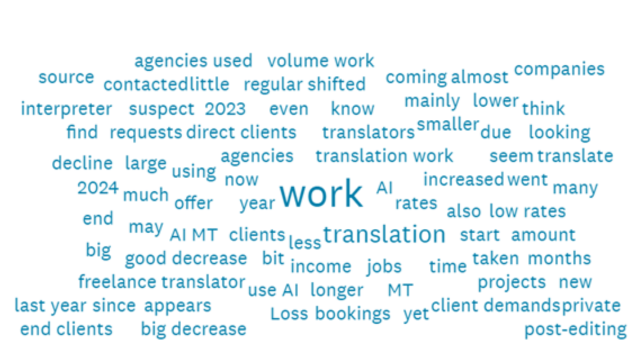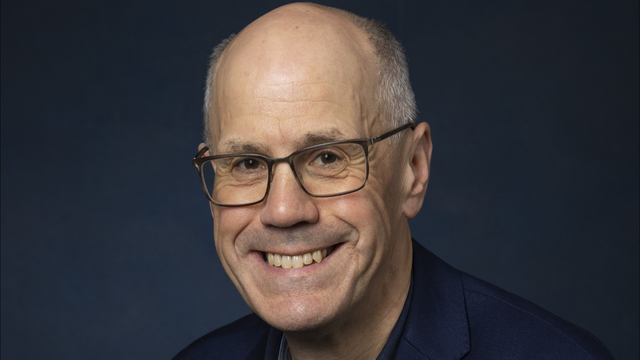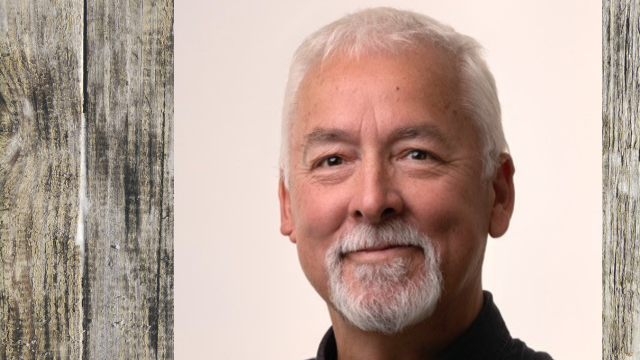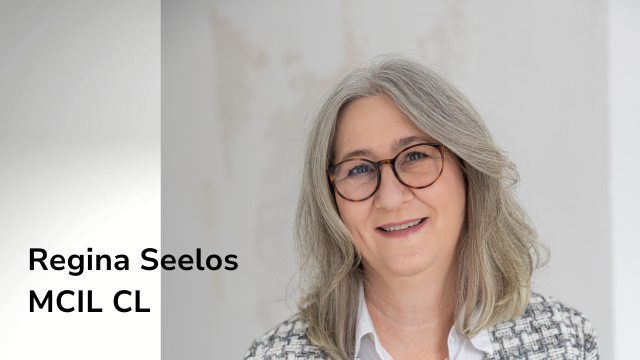-
QUALIFICATIONS
- For Linguists Worldwide
- For UK Public Services
- Preparation
- Policies & Regulation
-
MEMBERSHIP
- Join CIOL
- Professional Membership
- Affiliate Membership
- Chartered Linguist
- Already a member?
- Professional conduct
- Business & Corporate Partners
-
LANGUAGE ASSESSMENTS
- English
- All Other Languages
-
EVENTS & CPD
- Webinars & Events
- CIOL Conferences
- Networks
- CIOL Mentoring
-
NEWS & VOICES
- News & Voices
- CIOL eNews
- CIOL Awards
- The Linguist Magazine
- Jobs & Ads
-
RESOURCES
- For Translators & Interpreters
- For Universities & Students
- Standards & Norms
- CIOL & AI
- All Party Parliamentary Group
- In the UK
- UK Public Services
- Find-a-Linguist
All change? Freelance linguists discuss AI

By Dom Hebblethwaite
CIOL roundtable on freelance careers in a changing profession
The Chartered Institute of Linguists (CIOL) recently hosted an online roundtable addressing key questions about freelance careers in the language services industry. The event drew significant interest with over 850 registrations and 367 live attendees, reflecting the importance and widespread concern about the profession's future.
Current challenges and perspectives
Dom Hebblethwaite, CIOL's Head of Membership, opened the session with audience polls that revealed the main concerns facing freelance linguists today. The audience reflected CIOL's wider membership, with just over 60% identifying as freelance translators alongside a variety of other roles.
When polled about their biggest concerns, AI and lack of work topped the list, followed by declining rates and reduced workloads.
The presentation highlighted several factors affecting the industry beyond AI, including Brexit's impact on UK-EU trade, budget cuts in translation services, and declining language learning trends. Interestingly, the data showed regional differences in AI adoption, with Asian countries more readily embracing the technology compared to Western ones.
When asked about career sustainability, before the panel began opinions were mixed:
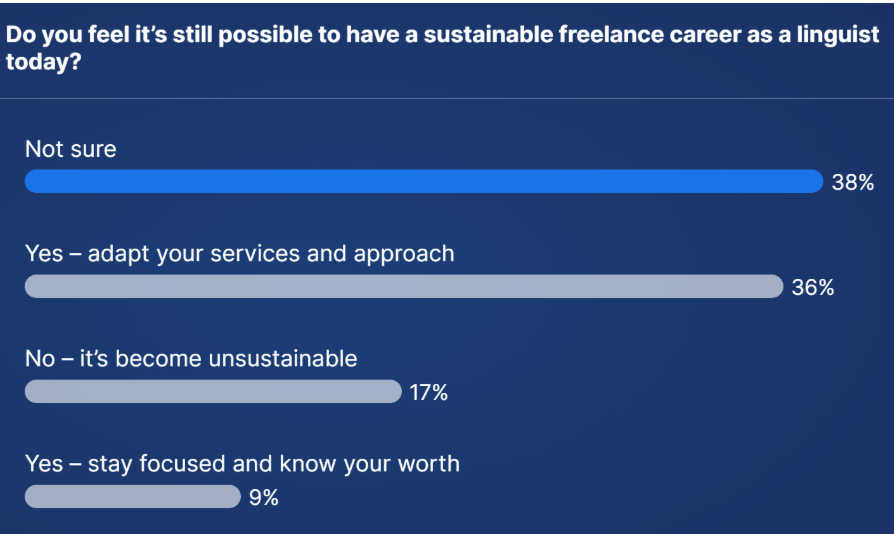
Panel insights
Three experienced linguists shared their perspectives on navigating the changing landscape. Karine Chevalier-Watts, former Chair of CIOL's Translation Division, described her transition from freelance work to full-time employment as a bilingual paralegal after experiencing a significant decline in translation work from mid-2024. She noted that many agencies she worked with had either closed or been acquired, reflecting broader industry consolidation.
Ilenia Goffredo, Director of LingBox Ltd, acknowledged the difficulties whilst maintaining that success remains possible with proper adaptation. She emphasised the importance of viewing AI as a tool rather than competition and focusing on the human elements that technology cannot replace, such as cultural understanding and client relationships.
Ibrahim Kadouni, owner of InArabic Ltd and interpreter trainer at the University of Surrey, encouraged linguists to view industry changes as opportunities for growth. He stressed that the language services market continues to expand, though the nature of work and required skills are evolving.
Adapting to change
The panellists agreed that traditional job titles like "translator" or "interpreter" no longer fully describe modern language professionals' roles. Today's linguists increasingly work as language consultants, offering services that extend beyond direct translation to include copywriting, localisation strategy, content adaptation, and cultural consulting.
Key adaptation strategies discussed included:
- Diversifying services within areas of expertise rather than limiting offerings to traditional translation
- Building direct client relationships that value human expertise and communication
- Developing business skills including marketing, project management, and client relations
- Networking with other professionals to create collaborative opportunities
Advice for early-career linguists
For students and those new to the field, the panellists recommended:
Key adaptation strategies discussed included:
- Gaining practical experience through volunteering and internships
- Choosing specialisations whilst remaining flexible about service offerings
- Building a professional network early through industry associations and events
- Developing a clear value proposition beyond basic language skills
- Being selective about which agencies and clients to work with
The discussion acknowledged that introverted professionals might find the increased emphasis on networking and self-promotion challenging. Suggestions included starting with online presence building and creating small support networks before tackling larger networking events.
Industry outlook
Whilst the roundtable addressed serious challenges, the overall message was one of adaptation. The panellists emphasised that opportunities exist for those willing to evolve their services and approach. Several participants noted that whilst traditional translation volumes might be decreasing, demand for language-related services in new areas continues to grow.
The event highlighted that success in today's market requires more than linguistic skills alone. Modern freelance linguists must combine language expertise with business acumen, technological awareness, and strategic thinking to remain competitive.
Moving forward
The high attendance and engaged participation in this roundtable demonstrate the importance of ongoing dialogue within the language services profession and community. As the market continues to evolve, forums for sharing experiences and strategies become increasingly valuable.
For freelance linguists, the path forward involves embracing change whilst leveraging unique human skills that remain irreplaceable. Whilst the landscape has undoubtedly shifted, those adapting their services and expanding their professional identity can still build sustainable careers in the language profession.
The recording of this roundtable is available on our YouTube channel, click here to view.
Dom Hebblethwaite is the Head of Membership for the Chartered Institute of Linguists.
For more on Dom see his profile here.
Views expressed on CIOL Voices are those of the writer and may not represent those of the wider membership or CIOL.
More
The Chartered Institute of Linguists (CIOL), Incorporated by Royal Charter, Registered in England and Wales Number RC 000808 and the IoL Educational Trust (IoLET), trading as CIOL Qualifications, Company limited by Guarantee, Registered in England and Wales Number 04297497 and Registered Charity Number 1090263. CIOL is a not-for-profit organisation.

